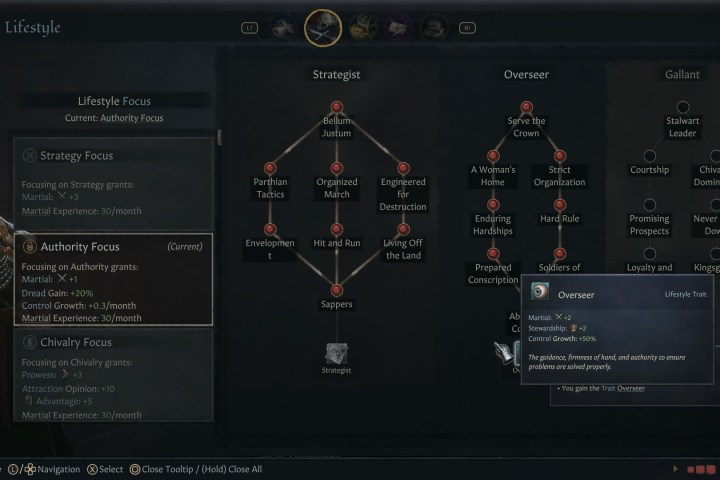To ensure the longevity of your dynasty, you need to equip your descendants with the best traits in Crusader Kings III. However, these traits come in all shapes and sizes. Your children inherit some from their parents while developing others through life events. You can unlock a few valuable traits by leveling up specific lifestyle trees, and others come from RNG events that are out of your control.
So, which traits should you look for when crafting the “perfect children?” In this guide, we’ll cover the best traits in Crusader Kings III, how to unlock them, and how to ensure they pass down to your heirs.
- The best starting characters in Crusader Kings III
- Crusader Kings III beginner’s guide: 10 tips and tricks to get started
- The best strategy games
Congenital versus learned traits in Crusader Kings III
Crusader Kings III comes with numerous traits that break into multiple categories. For the sake of this article, we’re sorting them into two primary groups: Congenital (inherited) traits and learned traits.
Congenital traits pass between parent and offspring and level up based on the parent’s initial level. These include traits like Beautiful and Genius, and the word “congenital” always appears under the trait description.
There are six primary congenital traits in Crusader Kings III. Three of them are good, and three of them are bad. There is no benefit to inheriting any bad ones, so avoid them like the plague (pun intended).
The good-leveled traits break into three schools: Bright Minds, Beautiful Characters, and Physical Specimens. Arranged low to high, they are:
- Bright Minds: Quick — Intelligent — Genius
- Beautiful Characters: Comely — Pretty/Handsome — Beautiful
- Physical Specimens: Hale — Robust — Amazonian/Herculean
The bad traits work the same way but aren’t worth mentioning. You’ll know them when you see them, and unless you marry that person into the family, you can easily keep them out of your bloodline.
Leveling up traits is straightforward. If you marry two people with the same level of trait, you’ll see a green arrow pointing up. That trait now has a 50% chance of “leveling up” in their offspring. On the other hand, if you marry two characters with different level traits, both have a chance of showing up.
- 1. These characters have the same level trait (Comely), which may level up to Handsome/Pretty in their children.
- 2. These characters have different level traits (Comely and Handsome), which can equally pass down to their children.
You can also look for level-three congenital traits when marrying or marrying off your children. This method is beneficial for your first character, especially if you don’t start with a wife or heir (or find a way to get rid of them).
To ensure these traits pass down to your heirs, consider investing in the Blood dynasty tree, specifically the Convergent Blood perk that increases the chance of reinforcing congenital traits by 30%. As long as you avoid characters with bad traits, you shouldn’t run into issues inheriting them.
Otherwise, several appearance traits can pass from parent to child. Most of them are negative and govern the character’s appearance and mental state. These include Club Footed, Dwarf, and Lunatic. However, some good traits like Giant (+6 prowess) and Fecund (+50% fertility) have their benefits outside of your family. More on that later.
Learned traits develop through life events, random events, education, and lifestyle trees — basically every other trait in the game. Still, it’s important to know which you should look for, which ones counteract each other, and which can hurt you rather than help you.
Your wards experience life events and develop their personality traits based on your answers. These include traits like Greedy, Temperate, and Zealous. If you’re not careful, you could accidentally stamp a personality trait on your heir. Always open your tooltip pointer and read what each decision leads to and what that personality trait entails.
While under your guidance, children also develop education traits based on their education focus and their guardian’s skill in that field. So, if the child has a Stewardship education focus, assign a guardian with high stewardship to increase their chances of developing a good education trait.
Best congenital traits in Crusader Kings III
Since there are only a handful of congenital traits, they’re all the best traits in Crusader Kings III in their own regard. Let’s touch on each and explain how they benefit your family, bloodline, and court in different ways.
Genius

Genius is one of the best traits in Crusader Kings III. Genius grants +5 to all of your skills and increases your lifestyle XP gains by 30%. When you take over Genius characters — if they’re old enough — they’ll often have one or two perk trees already filled out in their preferred lifestyle.
Genius should be your primary focus when building your immediate family in Crusader Kings III. You always want your player heir to have the Genius trait. Furthermore, you always want to marry someone who has the Genius trait, ensuring that you’ll always pass it on to your children.
Beautiful

The Beautiful trait grants +3 diplomacy and increases your attractiveness and fertility by 30%. Beautiful characters make great diplomats, so try working this into your secondary family (cousins, nieces, nephews) and appointing them as your Chancellors once you assume control of your player heir.
Amazonian/Herculean

Depending on their gender, Amazonian women/Herculean men get +8 to their prowess, a huge health boost, and +15 to attractiveness. Unless you’re commanding your armies, the only reason to work this into your direct bloodline is if you’re going after the Strengthen Bloodline decision.
Instead, breed this trait into your knights to produce the best army commanders possible. Then, make them your vassal so their super-kids don’t leave your court and fight for someone else.
Fecund

Fecund increases your fertility by 50% and life expectancy by five years. However, don’t work Fecund into your immediate bloodline, as you’ll have too many children. This is detrimental in the early game as your three or four heirs split all your lands.
Instead, work Fecund into your extended family to produce more nieces and nephews. Then, breed other congenital traits, crafting the perfect councilors and knights for generations.
Giant

The Giant trait comes with pros and cons. On the one hand, it increases your prowess by +6 but comes with a minor health penalty. Tribal rulers appreciate Giants more, and your vassals, in general, have a +5 opinion of you. Try turning them into giants once you breed the Amazonian/Herculean traits into your knights. See how quickly enemy armies run in fear of your superhuman fighting squad.
Best lifestyle traits in Crusader Kings III
You’ll come across some of the best traits in Crusader Kings III as you fill out your lifestyle trees. These traits give your character significant boosts to their primary skills, and perks attained along the way make running your empire even easier. Remember, these lifestyle traits don’t pass down to your children. They’ll have to level up their trees and earn the traits all over again. Here are the five best lifestyle traits in Crusader Kings III.
Overseer

As the final perk in the Overseer tree under the martial lifestyle, the Overseer Trait increases your control growth by 50%, which is crucial for declaring back-to-back wars and expanding your land. The lower your control, the fewer taxes and levies you’ll collect from new lands — lands that aren’t happy about being recently conquered.
Paired with the Authority Focus, the Absolute Control perk, and the Serve the Crown perk, you’ll have your new territories under control in no time.
Avaricious

Avaricious and its associated skills are crucial to becoming filthy rich. After filling out the Avaricious stewardship tree, you unlock this trait, giving you +2 stewardship and 15% holding taxes. The higher your stewardship, the more holdings you can have. Therefore, we like to pair this with the Domain Focus, giving us an extra +3 stewardship.
Remember, every five stewardship points increases your domain limit by one. So, if you have 20 stewardship, you can have four extra holdings (on top of what your rank permits). The more holdings you have, the more money you earn since you get 100% taxes and levies from your domain.
Scholar

As the last trait in the Scholar tree under the learning lifestyle, the Scholar trait increases your learning by +5, your hostile/personal scheme chance by 10%, and your development growth by 15%. However, the Learn On the Job perk is arguably better, taking 20% of your counselor’s skills and adding them to your own.
Schemer

For those Tyrion Lanisters of the world, completing the Schemer tree under the intrigue lifestyle unlocks the associated perk. Schemer grants +5 to your intrigue while increasing hostile scheme power by 25%. At that rate, you’ll be murdering and kidnapping at your dark heart’s desire. Pair this with the Skullduggery focus (the NPC above has Temptation Selected for some reason) for increased agent acceptance and +3 intrigue.
The Twice Schemed perk allows you to run two hostile schemes at once, and the Prepared for Anything/Job Done Right perks combined give you a +50% swing in hostile scheme chance.
Architect

As another perk in the stewardship lifestyle (and one you should consider to rake in the gold), the Architect trait boosts your overall construction abilities with:
- Building and Holding construction time: -15% (builds faster)
- Building and Holding construction cost: -15% (cheaper)
Buildings, holdings, and development are how you’ll earn more gold. Therefore, Architect and other holding-boosting skills are among the best traits in Crusader Kings III. If you can get the Architect and Scholarship traits on one character, you can build out your holdings quickly, provided you have the gold.
Best personality traits in Crusader Kings III

Personality traits in Crusader Kings III buff/debuff your overall skills and shape how other characters think of you. These traits stick with you for the rest of your life, so choosing the right ones in childhood is crucial later in life.
As you educate children, you’ll encounter random events presenting you with a set of options. Each option stamps a personality trait onto that child, so make sure you read each one carefully and use your tooltip pointer to see what each trait does.
Additionally, if your children have guardians other than you, you’ll be prompted to answer these questions. However, your control dwindles outside of your direct family. Therefore, unless you educate your grandchildren or assign guardians to them, you’ll have little control over their personalities.
While on the subject of education, assigning the best guardians can help children develop education traits that’ll help them later in life. These include Midas Touched (+8 stewardship) and Elusive Shadow (+8 intrigue). Each skill has four leveled education traits adding +2, +4, +6, or +8 to that skill (except for prowess).
To get high-tier education traits, you must match the best guardian to the child based on their education preference. So, a child with a Diplomacy education preference should be taught by a character with high diplomacy, preferably someone with the Genius trait, for the best results.
Each personality trait has a conflicting/opposite version. For example, Craven is the opposite of Brave, and Wrathful is the opposite of Calm. Each personality trait comes with its pros and cons, so which is best for you depends on your playstyle. However, we’ve narrowed down five personality traits that you should look for when molding your children. They are:
- Temperate: +2 stewardship and minor health boost
- Gregarious: +2 diplomacy, +5 attraction, +15% personal scheme power
- Greedy: +5% monthly income and +10% monthly income per stress level
- Diligent: +2 diplomacy, +3 stewardship, +3 learning, -50% stress loss
- Ambitious: +1 to all skills and prowess, +25 stress gain
Ultimately, if you can keep your stress in check, any combination of these five traits puts you on the right path. You can only have three personality traits, so don’t go looking for all five. However, there are some personality traits you’ll want to avoid at all costs. These are:
- Shy: Induces stress whenever you try swaying someone (which you’ll often do).
- Gluttonous: -2 Stewardship — nobody likes a glutton.
- Paranoid: Good for intrigue build, but at 100% stress gain, you’re better getting the +3 intrigue somewhere else, like Arbitrary.
- Compassionate: Doing anything remotely “bad” to someone causes stress. You’re better off being Sadistic.
Finally, as there are far too many traits to cover in one guide, you can always consult the Crusader Kings III trait wiki for an extended breakdown of every trait in the game.
Editors' Recommendations
- The best games on PlayStation Plus, Extra, and Premium
- All upcoming PS5 games: 2024 and beyond
- Is Stardew Valley cross-platform?
- Best PS5 deals: Console bundles, top games, and accessories
- The best skills to buy first in Another Crab’s Treasure








